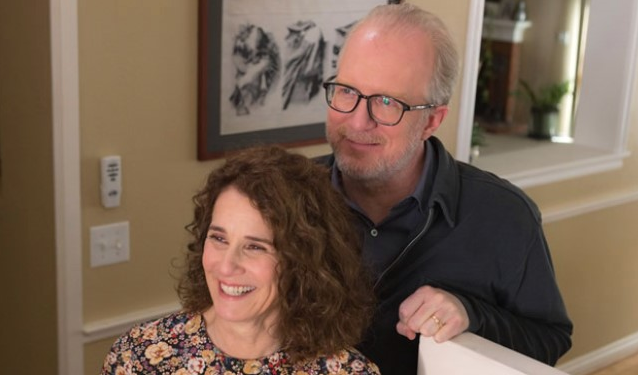Breaking up is hard to do. Unmarrieds often have to make a couple attempts before it really sticks, as the affection/attraction that kept them together for this long makes it difficult to break cleanly. With a married couple, it’s even more complicated, as there are factors beyond a lingering fondness – children, shared property – that delay a separation that has come to seem inevitable to all concerned parties. So married couples can exist in a de facto state of separation for years, even decades, eventually barely bothering to veil their mutual hostility.
The Lovers, the new movie from writer-director Azazel Jacobs, explores what happens when such a strained married couple steps back from the brink – and starts shagging each other like they were 20 again. Among the many mysteries of what keeps romantic partners together over long periods of time, this response is perhaps no more unusual than any other, but it seems far more characteristic of the animal magnetism that binds those 20-year-olds than a husband and wife approaching 60. Which does not make it feel any less true in the context of this story and these characters.
Mary (Debra Winger) has in fact already surpassed her 60th birthday, though her husband, Michael (playwright Tracy Letts), still has eight years to go. Together they have a university-aged son (Tyler Ross) who is bringing his girlfriend (Jessica Sula) home for a visit. That’s the only thing keeping them both from formally ending their marriage and going off with their respective lovers (Aidan Gillen and Melora Walters), whose existences are kept a secret from one another – more out of respect than out of a strategic desire to deceive. Their awkward manner with one another around the house suggests they both know the marriage is dead, to such an extent that the existence of other love interests is sort of beside the point.
Their relationships with their lovers have reached similar states of strained urgency, as his girlfriend and her boyfriend are both well past wanting to come out in the open, and are beginning to doubt whether the other is really telling the truth about wanting to end the marriage. Mary and Michael laugh this off, and rightly so – until the one day when they’re both dressing before work, a ritual long ago stripped of any erotic subtext, and suddenly they can’t keep their hands off each other.
Winger and Letts are key to selling the sort of gimmicky structure. Winger has always been an acting treasure, though it’s certainly nice to see her reappear in a prominent role, especially with the paucity of roles for actresses her age. So the real revelation here may be Letts, who made his name as a playwright (August: Osage County) and stage actor, but has started acting on film more regularly, largely in supporting roles. The Lovers indicates he’s ready for his spotlight. The story Jacobs is telling is both funny and melancholy, and Letts captures this balance perhaps more expertly even than Winger, especially in a moment where he is unexpectedly confronted with what he might lose and how much he does not want to lose it. He’s also got a great scene where he succumbs to gales of laughter over his joyous disbelief that he’s just had a hot romp between the sheets with his wife. The two actors have the chemistry to convince us both that they were once a couple, and that they’re now estranged – but also that picking back up again is something they might actually do. Their scenes together feel the most truthful, as the scenes with their lovers tend to be a bit broader and to make Gillen’s and Walters’ characters a bit too needy and unstable.
One actor does prevent the film from having its maximum impact: Tyler Ross, who plays Joel, their son, and who doesn’t appear on screen until two-thirds of the way through. Clearly he has complicated feelings toward his parents, particularly his dad, as Joel reveals that Michael had an affair in the past that led to some of the initial difficulties between his parents. But given that he has written his parents off as a lost cause, making churlish remarks to his girlfriend about how they should break up, his reactions to some of the later turns of events seem out of scale. Perhaps it’s just that his emotional intensity is so at odds with the tone Jacobs has created.
Whether because of Ross’ contributions or no, the final third of the film stumbles just enough to knock this down from a really great film to a very good one. At the very least it’s a mature step forward for the writer-director of the 2011 film Terri, another gem for Jacobs but in a much more minor way. The Lovers showcases the major talents of a number of its collaborators, and a keen eye for the peculiarities of the human heart.

